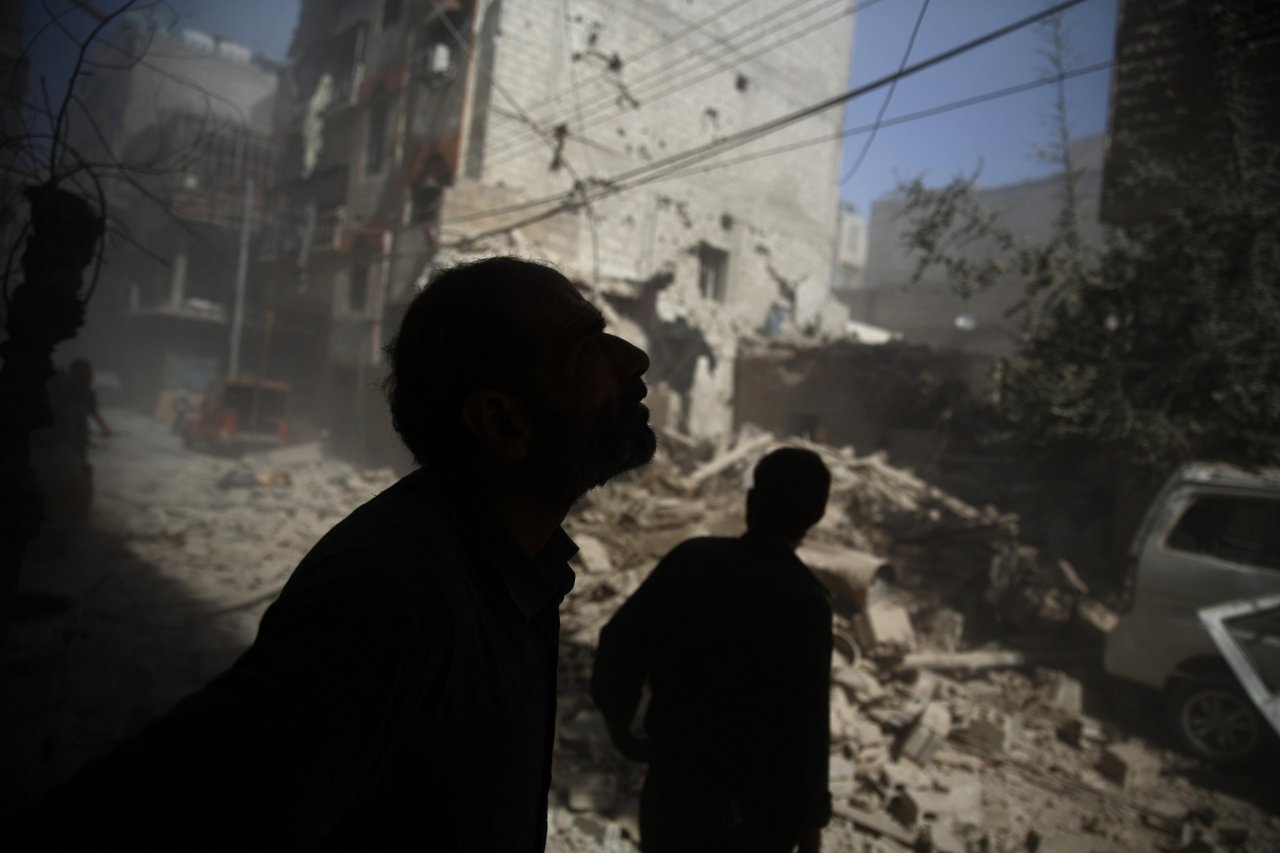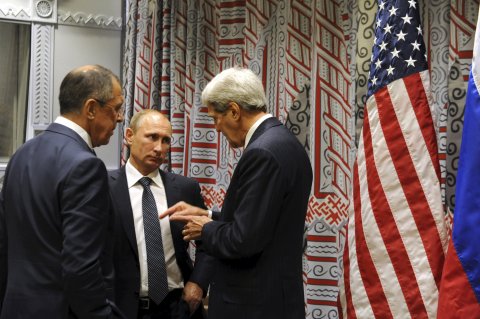
Updated | The Russians called it Center 2015: a series of military exercises they carried out in mid-September involving some 95,000 troops. In contrast to common practice, Moscow outlined publicly with great specificity what type of exercises its troops conducted. Its Hind attack helicopters, for example, practiced rocket and bombing runs against ground targets and provided air cover at very low altitude to ground forces. They fired unguided rockets against military columns below. They practiced flying with one engine off—simulating engine failure—at just 650 feet above the ground. "These are the kinds of skills," noted a report from the Institute for the Study of War, "that would be required if the Russians intended to provide close air support to Syrian, Iranian, or Lebanese Hezbollah troops in contact with rebel forces."
[Related: Where the Candidates Stand on the Trans-Pacific Partnership]
Which they plainly did, because that's what Russian forces are now doing.
Whether Russia's incursion into the increasingly deadly Syrian civil war was foreseeable or not—and if it was, whether it was deterrable—is now moot. Russian President Vladimir Putin has in an instant changed markedly the course of a conflict that has claimed at least 250,000 lives and displaced millions—numbers that may yet grow much higher. Moscow and Iran, Damascus's heretofore primary benefactor, are now making it clear that they are all-in when it comes to defending the current regime. On September 21, Iran began dispatching hundreds of elite Quds Force soldiers—the expeditionary arm of Iran's Revolutionary Guard—as well as its leader, Qassem Suleimani, to lead ground assaults backed by Russian airpower against the forces opposing Syrian President Bashar al-Assad. They have since been joined, according to intelligence reports, by deployments of Iranian and Iraqi Shiite militias.
They are there for a very specific reason, which is not simply to combat ISIS. By October 5, in fact, the Pentagon had become convinced that the majority of Russian air strikes thus far had targeted not ISIS units, but U.S. trained rebel groups in various parts of the country. The Russian troops are there to combat anyone and everyone who might fight against Assad, who the U.S. and its coalition partners still insist has to go. Indeed, on September 29, at the United Nations, Saudi Foreign Minister Adel al-Jubeir could not have been clearer: "Assad has no future in Syria. Any attempt to whitewash him or make him acceptable is a nonstarter," he told reporters.
The Russian intervention, as President Barack Obama, al-Jubeir and everyone else involved understands, comes at a critical moment. Despite the relative passivity and ineptness of the United States in funding and training anti-Assad rebels, the dictator's position was slowly eroding as he attempted to fight off multiple rebel groups of varying sectarian and ethnic stripes (everything from hard-core ISIS fighters to more "moderate" Sunnis to Syrian Kurds). For Putin, a man who says repeatedly—because he believes it—that the greatest "geopolitical catastrophe" of the 20th century was the demise of the Soviet Union, the motivation is straightforward: "You do not give up your friends," as Alexei Makarin, deputy director of the Center for Political Technologies, a Moscow think tank, puts it.
But from Moscow's perspective, there likely was more to it than that—much more. The move provides a foothold in a part of the world that the Soviet Union was kicked out of four decades ago. At a moment when the United States appears to be washing its hands of the increasingly bloody and chaotic region, it gives Russia an expanding military presence in the Mediterranean on the doorstep of a NATO ally (its newly established airfield at Latakia in eastern Syria sits just 75 miles from the border with Turkey), and the gambit may yet serve as leverage with the West as Putin seeks to get out from under economic sanctions imposed as a result of Moscow's annexation of Crimea in Ukraine.
A senior Arab intelligence officer in the region called Putin's actions "potentially game-changing." Obama seemed less impressed—or less willing to congratulate the Kremlin on its cunning, at least in public. All this was done out of a position not of strength but of "weakness," he said at a White House news conference in early October. "This is not a smart strategic move on Russia's part."
Throughout much of the Middle East, that declaration was met with howls of derision (for reasons that we will get to); at home, it was dismissed by many as petulant spin from a president who had been badly wrong-footed in this war. But whether Obama had been wrong-footed or not, the logic behind what he said is not obviously wrong. That Syria's a snake pit couldn't be more obvious. And it's true, as sources in Moscow and the Middle East acknowledge, that if Russia decides more troops are needed to bolster its position, it may be drawn into a quagmire it can ill afford. "The [Russian military] bases in Syria have taken on sacred significance for [us] now," says former Kremlin adviser turned critic Gleb Pavlovsky, "and we cannot surrender them. This will take soldiers."
[Related: Syrian Rebel Groups Appeal For Regional Alliance to Fight Russia and Iran]
Despite a still-grim economy in Russia, Putin remains popular in his country. Most of what he does to show that Moscow is a serious player on the world stage only buttresses that good opinion. But the public appetite for a war against anti-Assad rebels in Syria appears limited, to say the least. The Levada Center, one of the few organizations in Moscow thought to be a relatively credible source of information about public opinion in Russia, found in a poll taken before the bombing in Syria started that found that two-thirds of the respondents were against deploying ground forces there. (The same day the poll appeared, Putin, while visiting the U.N., said any such deployment was "out of the question.")

In Sunni Arab capitals around the Middle East, one word is being uttered with increasing frequency: "Afghanistan." Not the ongoing post-9/11 U.S. war there, but the one before it: when the mighty Soviet army was driven out by jihadi rebels (who were funded by Saudi Arabia and other Gulf Arab states) and armed by the United States. As a student of what is known in Russia as the "catastrophe," Putin knows that the humiliating Soviet withdrawal came in 1989, after a decade of war. By 1992, his beloved Soviet Union ceased to exist. He also knows that the same countries that aided the Afghan rebels in the 1980s are now funding anti-Assad rebel groups.
So should the United States just say, "After you, Vladimir Vladimirovich. Be our guest! Syria's all yours," as GOP presidential front-runner Donald Trump, among others, has advocated? If at least part of Putin's plan is to combat ISIS—which, after all, the U.S. seeks to "degrade and destroy"—shouldn't we welcome Moscow's intervention, as Secretary of State John Kerry indicated Washington might?
The reasons why that's probably a terrible idea are numerous. The deployment of the Russian military and increased Iranian ground forces means Assad can stay in power for as long as his two patrons desire. At the same time, there is also little evidence that the axis supporting Assad has the wherewithal to crush the Sunni-backed rebel groups.
It's hard, therefore, to draw anything but the grimmest of conclusions. Syria—already a "geopolitical Chernobyl," as former CIA chief David Petraeus recently put it—is about to get worse. As Frederick Kagan, an architect of the surge in Iraq under George W. Bush and now director of the Critical Threats Project at the American Enterprise Institute, and Kimberly Kagan, founder and president of the Institute for the Study of War, wrote, "The advent of Russian reinforcements is likely only to cement a brutal stalemate that has driven millions of people from their homes, radicalized the region, caused a humanitarian apocalypse, and turned Syria into a magnet for global jihadists." (Global jihadis, he might have added, who may well fight another day in the capitals of Western Europe or even the United States.)
[Related: Global Poverty Rate Likely to Fall Below 10 Percent For the First Time: World Bank]
The Russian move into Syria will only deepen concern among Washington's traditional allies in the Middle East about U.S. goals in the region. Israel, Jordan, Saudi Arabia and other Gulf monarchies have all watched, with varying degrees of alarm over the last five years, as the Obama administration zealously pursued a nuclear deal with Iran, an archenemy to all of those countries. Obama did so over their strenuous objections. Many suspect—indeed, some are convinced—that his overarching goal in the region was to legitimize Iran, integrate it into the international system so as to, as he put it a 2014 interview, create an "equilibrium" between "Sunni, or predominantly Sunni, Gulf states and Iran in which there's competition, perhaps suspicion, but not an active or proxy warfare."
If Obama's goal was to get Iran to that place, starting with a nuclear deal, how likely was it that he was going to attack Syria in the wake of its chemical attacks, even having drawn a "red line" in 2012? Similarly, Tehran didn't want a more aggressively funded and trained Western-backed rebel force in Syria, and Obama hasn't done much to provide one. (Al-Jubeir, at a press conference September 29, said flatly, "Had there been more firm action [there], we would not be in the situation we're in.")
This relative inaction has bred toxic suspicions throughout Washington's traditional allies in the region—suspicions that are rarely voiced publicly but have hardened over the past 18 months. Simply put, they believe the Obama administration has not just pulled away from the Middle East but rather switched horses—backing Iran in search of that "equilibrium" the president spoke of last year. The White House has consistently and furiously denied this.
Now, with Putin in Syria and Obama just 15 months from his White House retirement, the likelihood that the U.S. will do anything of consequence to change the status quo on the ground is slim. It seems extremely unlikely that Obama will risk a direct conflict with Putin. Any hope of a no-fly zone in Syria, or even an intensification of U.S. airstrikes, is likely gone as well. Indeed, with Europe under tremendous pressure from the crush of Syrian refugees, the fear among Sunni Arabs is that the West will latch on to Putin and Iran as the only hope for reining in Assad.
But that's not why Russian troops are now fighting in Syria. They are there to prop up Assad by helping him destroy "terrorists"—defined as anyone fighting against his regime. It's been about four and a half years since Syria's civil war commenced—since it became a "geopolitical Chernobyl." The meltdown may have only just begun.
Additional reporting by Marc Bennetts and Claudia Parsons.
This story has been updated to reflect latest reports that U.S. officials say most Russian strikes are targeting non-ISIS sites.














